If you’re a mom of a baby with eczema, then you know how difficult it can be to find relief from the itch. This guide is designed to help you get started on the right track to finding some baby eczema itch relief for your little one.
Both of my kids suffered from eczema all over their bodies since they were about 3 months old. They both had multiple visits with the allergists and dermatologists and were put on prescription drugs. Baby Madi’s eczema is far worse than her older brother’s. She had episodes of whopping eczema where the blisters would ooze and turn into crusts. We would wake up to see blood smears all over her crib sheet from all those scratchings at night.
Like you, I felt hopeless seeing my baby itch all the time. I searched all over the internet, consulted with specialists, tried a ton of products, and even tried herbal remedies just so that I can help my kids find relief from eczema.
My firstborn, Baby W, is completely “cured” from his eczema since 2 years old. Baby Madi, on the other hand, still has infrequent eczema flare-ups at 18 months. But, she’s gotten MUCH better since a year ago.
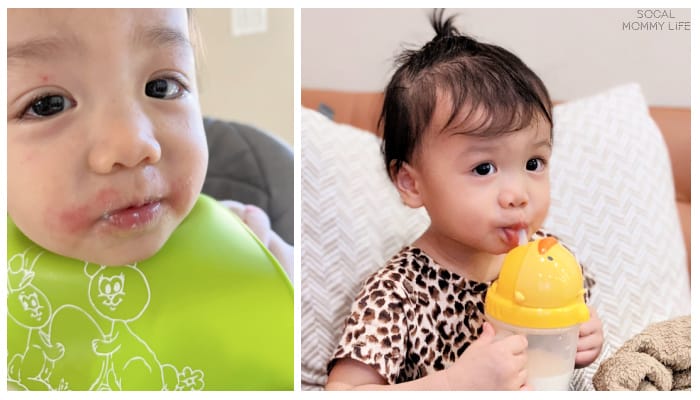
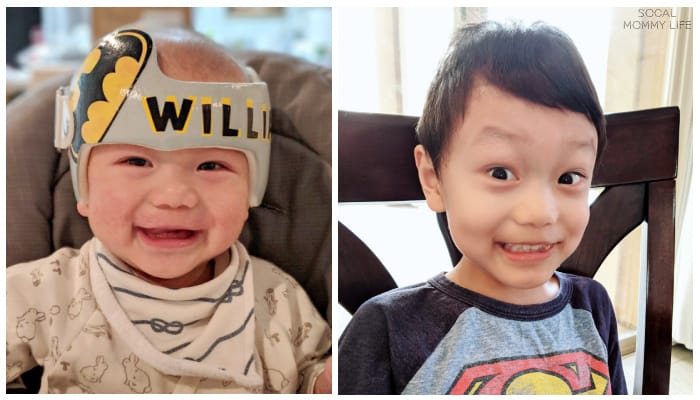
Today I’m going to show you all the things I’ve learned and done to help my babies find itch relief from eczema.
Keep in mind that every baby is different, so what works for one may not work for another. But these tips should give you a good place to start.
This post may contain affiliate links, which means I’ll receive a commission if you purchase through my link, at no extra cost to you. Please read full disclosure here.
What is baby eczema and what are the symptoms
Baby eczema, also known as atopic dermatitis, is a common skin condition that affects approximately 20% of infants (1). Symptoms include dry, red, and irritated skin that can be itchy and uncomfortable. While eczema can occur anywhere on the body, it is most often found on the face, neck, chest, and legs.
Here’s what to look for:
- Infants under 6 months: red, dry patches of skin appear, usually on the face, but may also be found on the body.
- 6-12 months: patches of eczema may appear on the elbows and knees.
The skin cells are like a brick wall. Children with eczema do not have the cement between the bricks. This means the water from the body escapes out of the cracks leading to dryness.
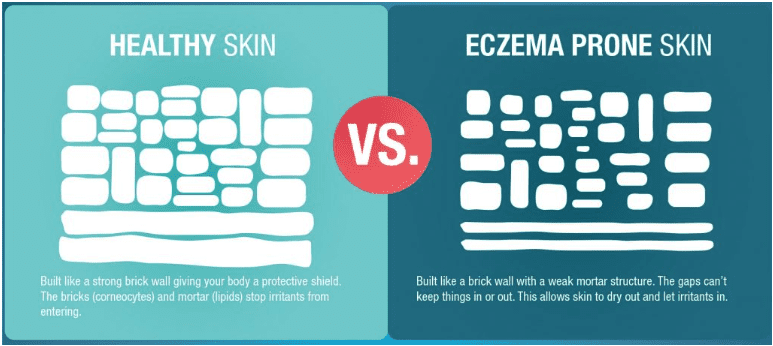
Now that you understand what eczema is, it’s important to know what causes the symptoms so that we can better tackle the problem.
Causes of baby eczema
Most cases of baby eczema are caused by a combination of genetic factors and triggers in the environment.
For example, if eczema runs in your family, you’re more likely to have a child with eczema. I’ve always had dry skin with occasional eczema on my body. My eczema flared up during both of my pregnancies so I’m not surprised that both of my kids have eczema.
However, even if there’s no history of eczema in your family, your baby may still develop the condition. This is because eczema is also thought to be triggered by environmental factors, such as dry skin, irritants like detergents or perfumes, extreme temperatures, stress, or allergens like pollen or pet dander (2).
While the exact cause of eczema is unknown, it’s thought to be related to overactive immune system response. In people with eczema, the immune system mistakenly thinks that harmless substances like dust or pollen are harmful invaders and produces inflammation in an attempt to protect the body. This inflammation can cause the symptoms of eczema, such as dryness, redness, itching, and flaking.
Eczema can be a difficult condition to manage, but with proper treatment and care, most babies with eczema will experience significant improvement.
How to relieve the itchiness associated with baby eczema
Listen to your pediatrician
First things first, get it confirmed by the doctor if you suspect your baby has eczema.
Pediatricians can recommend age-appropriate products and help you determine if stronger prescription treatments are necessary. The doctor will take a family history and try to help you identify triggers for your baby’s eczema in order to come up with the best treatment plan. If your baby’s eczema is more on the severe side, you may be referred to a dermatologist or an allergist.
The treatment plans we got from the doctors were different for Baby W and Baby Madi.
Baby W’s eczema was managed by our dermatologist after we ruled out allergen triggers (he did the infamous Prick Skin Tests). Baby Madi, on the other hand, is allergic to many things so our allergist manages her eczema. Consequently, the medicines prescribed were different between them both.
Don’t be afraid to use prescription steroid cream
Many parents are reluctant to use steroid creams to treat eczema in their babies, due to concerns about potential side effects. However, it is important to remember that eczema is a very itchy condition, and leaving it untreated can cause a great deal of discomfort for your child.
Studies have shown that weak steroids such as hydrocortisone are very unlikely to have negative effects on a child’s growth and development(3). While there are some risks associated with prolonged used of steroid creams, these should be weighed against the relief that they can provide.
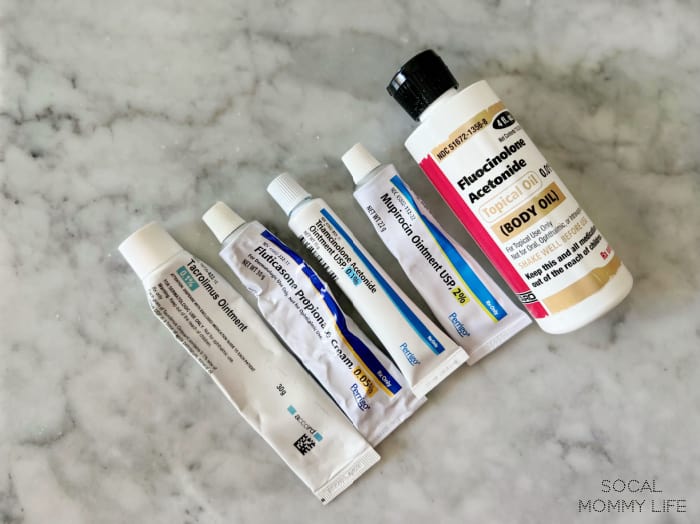
If your baby is suffering from eczema, talk to your doctor about the best course of treatment. In most cases, the benefits of using a steroid cream will outweigh any potential risks.
If you’re really concerned about giving steroid cream to your baby, your doctor may prescribe non-steroid medicine for eczema. For Madi, our doctor prescribed Protopic (tacrolimus) which is a non-steroid cream for her face. It’s absolutely safe for daily use on the face.
Swap out liquid soap with bar soap
One simple eczema itch relief is to switch from liquid soap to bar soap. Bar soaps often contain glycerin, which can help to soothe eczema flare-ups. Glycerin is a natural humectant, meaning it helps the skin to retain moisture. For best results, choose a hypoallergenic and fragrance-free soap.
Our dermatologist recommends the Dove Beauty Bar for Sensitive Skin. It’s fragrance-free, hypoallergenic, and formulated with ¼ moisturizing cream. After first using it on my kids, I started washing with it myself too!
Properly moisturize your baby’s skin
Make sure that your baby’s skin is properly moisturized. This will help to reduce inflammation and keep the skin barrier intact.
Remember the brick wall analogy we talked about earlier?
Moisturizer creams are like a layer of paint across the top of the brick wall for eczema-prone skin. This will stop the dirt and germs from getting in, but also to help keep the water in the skin so that it remains hydrated.
But with so many moisturizers on the market for baby eczema, which one do you use?
Pediatricians will mostly recommend brands like Cetaphil, Cerave, and Aveeno, as these products have been accepted by the National Eczema Association (just look for the Eczema Association Seal). We use the CeraVe Daily Moisturizing Lotion and Cetaphil Baby Daily Lotion on our kids occasionally as a full-body moisturizer.
It’s important to use different moisturizers for your baby’s face and body because the skin on each is unique.
For the delicate face/cheeks area we use the Mustela Stelatopia Emollient Baby Face Cream twice a day. This is by far the best baby eczema treatment on the face we’ve used. This line of Mustela products is designed specifically for baby eczema. It’s gentle and replenishing with natural avocado perseose and sunflower oil distillate. This cream is gentle enough to be applied on the baby’s eyelid and around the lips.
As for the body, we found the most eczema itch relief with Mustela Stelatopia Emollient Balm. The emollient cream has a velvety texture and is instantly absorbed. With everyday use, I see lots of improvement in my kids’ itching, discomfort, and redness.
Another product I highly, HIGHLY recommend is the Organic Manuka Skin Soothing Cream by YoRo Naturals. This cream is pretty thick and can leave a sticky residue but it’s super effective. It contains active organic Manuka Honey which has anti-inflammatory and anti-bacterial properties. On the times when Baby Madi would scratch and leave bloody checks, I apply a thick layer of this honey cream and her wounds would heal the next day! We are currently on our 6th jar!!
Seal moisturized skin with occlusives
After applying a moisturizer, it’s essential to seal in the moisture with an occlusive.
An occlusive is a barrier that prevents water loss, keeping the skin hydrated for longer. Using an occlusive after moisturizing can help to reduce eczema flare-ups and provide your baby with much-needed relief.
You probably already have a jar of Aquaphor Healing Ointment. It’s such a miracle product because it has occlusive ingredients such as petrolatum and lanolin that keeps skin moist.
Our dermatologist recommended Albolene as a safe and effective treatment for baby eczema. Research has shown that Albolene is just as efficacious as leading prescription medicine in the reduction of dryness, scaling, itching, redness, and peeling related to eczema(4).
After we’re done with Aquaphor, our kids switch to Albolene and vice versa. I found them both equally effective in keeping their skin moisturized.
Moisturize at least 4 times a day
You know how important it is to keep your baby’s skin moisturized. But what you may not realize is that you need to moisturize more often than twice a day as doctors recommend. That’s because when babies drool, eat and move around, the moisturizer gets wiped away. And since eczema is caused by dry, irritated skin, it’s important to replenish the moisture as often as possible.
We have 4 of these Mustela’s Baby Nourishing Stick. One for each floor of the house, one in the diaper bag, and one at the daycare. It fits in one hand, so you can carry it with ease or tuck it away into any pocket. You apply it directly to your baby’s skin so no cross-contamination with your fingers.
What I love about this stick is that it has both humectants (helps skin retain moisture) and occlusive (barriers that prevent water loss) ingredients. I noticed that Baby Madi doesn’t itch as much when I differently apply this multiple times a day.
It’s a lot of work, but it’s worth it to see my baby get relief from the itchiness.
Give probiotics a try
Topical treatments can only do so much. That’s where probiotics come in. Probiotics are live microorganisms that are similar to the good bacteria found in our gut. Probiotics are available in many forms, including supplements, yogurts, and fermented foods. Some research suggests that they can help to reduce inflammation and improve skin barrier function, both of which are key factors in eczema (5).
I never heard about the association between probiotics and eczema itch relief until I heard it from our allergist recently. I started giving Madi the Stonyfield Organic Probiotic Yogurt along with Flora Toddler’s Probiotic. In just 3 days, I noticed a huge difference in her eczema.
Note that probiotics are live organisms so they are most stable when cold. I get my Flora Toddler’s Probiotic at Spouts Farmers Marker where they have them in the refrigerated section.
Here’s a quick probiotic breakfast recipe.
- Smash 1/2 ripe banana
- Mix in 1/2 cup Stonyfield Organic Probiotic Yogurt
- Stir in 1/2 tsp Flora Toddler’s Probiotics
- Mix in 1 tsp ground flaxseed (optional)
Also if your baby is on formula, I highly recommend swapping out for formulas that contain probiotics. Both of my kids were on the HiPP hypoallergenic formula. This specific formula contains both prebiotics and probiotics, making it the best formula for babies with eczema.
RELATED ARTICLE: HiPP Baby Formula Review – Everything You Need to Know
Dress comfortably
Clothing can play a role in eczema relief, as it can help to protect the skin from irritants while also providing a barrier to scratching.
When dressing a baby with eczema, it’s important to choose soft, breathable fabrics that won’t aggravate the skin. Natural fibers such as cotton or linen are often best, and you may also want to avoid clothing with rough seams or tight-fitting garments.
I only dress my kids in 100% cotton clothes as synthetic fibers such as polyester are not breathable and can irritate the skin.
You can also put mittens and old socks on your baby’s hands to prevent them from scratching (this only works if your baby keeps them on obviously😉). Alternately, there are Scratch Sleeves that are easy to put on and stay firmly.
Baby eczema itch relief frequently asked questions
Do air purifiers help relieve baby eczema?
In theory, air purifiers help to remove airborne allergens and irritants from the air, which can trigger eczema flare-ups. In addition, they can help to reduce the amount of dust and mold in the home, both of which can cause or worsen eczema symptoms.
I didn’t get an air purifier until Baby Madi was 6 months old because I’ve always thought that air purifiers are gimmicks. I can’t “see” the air being purer so how do I know if it really works?
After using it for a year now (we have one running all night in the kids shared room), Baby Madi’s eczema has improved a lot. I no longer wake up to see bloody sheets and she’s all over with prescription medicine.
But to be honest, I can’t attribute all these improvements to air purifiers alone. It may play some role in eczema relief, but not all.
If your house tends to get dusty or if your baby also has asthma, then I would recommend giving air purifiers a go. However, if you keep your house relatively clean and dust-free, then hold off on getting an air purifier.
How can I soothe my baby’s eczema at night?
The last thing you need is pulling an all-nighter trying to comfort an itching baby. So, if your baby has prescription eczema medicine or other steroid creams, apply them before bed. Then, apply a thick layer of moisturizer on top of that. This will help to protect the skin and prevent the need for constant scratching.
Also, use a humidifier in the bedroom to add moisture to the air. This will help to keep the skin hydrated and reduce the risk of flares. Finally, put your baby in cotton pajamas with built-in mitten cuffs to avoid scratching at night.
If your baby has woken up in the middle of the night from all those itchiness, you can try to give him a soothing massage. In fact every day after bath, I massage my babies with organic calendula and jojoba massage oil as part of their bedtime routine. The jojoba and calendula will help to soothe the itch and inflammation associated with eczema. Plus, the massage itself will be calming and help your baby to feel more comfortable.
By following these simple tips, you can help to ease baby eczema symptoms and improve your little one’s sleep.
Should you bathe a baby with eczema every day?
Whether or not you should bathe a baby with eczema every day is a question that doesn’t have a straightforward answer. On the one hand, eczema can be extremely itchy, and bathing can provide relief. On the other hand, eczema can also be aggravated by water, so bathing your baby too often may not be the best solution.
Some experts advise against everyday bathing, however, others suggested a daily soak is fine as long as it’s followed by plenty of moisturizers (6).
I usually bathe my babies in lukewarm water every day because it’s part of their bedtime routine and a bonding time for us. However, during the winter when the air is dry I only bathe them every other day.
You may need to experiment to find what works best for your child, but always moisturize, moisturize, moisturize after every bath!
Do babies with eczema grow out of it?
You may be wondering if there’s any hope that your little one will outgrow the itch. The good news is that eczema often improves as children get older. For some children, eczema starts to go away by age 4. However, some children may continue to have dry, sensitive skin as they grow up. It is hard to predict which children will outgrow the condition and which ones will have eczema as adults (7).
Baby W completely outgrew his eczema by age 2. He has not had any eczema flare-ups since then. As for Baby Madi, we are still working on managing her eczema but I have high hopes that she’ll outgrow it in the future.
Final thoughts on baby eczema itch relief
If you are struggling with a baby that has eczema and is always scratching herself, try some of the methods mentioned in this article. I hope they help to provide relief for your little one.
If you have specific questions, please don’t hesitate to leave a message below.
Baby eczema itch relief related articles
- The Only Ferber Method Guide You’ll Need To Successfully Sleep Train Your Baby
- Developmental activities for a smarter baby
- 12 Natural Cold Remedies For Toddlers That Actually Work


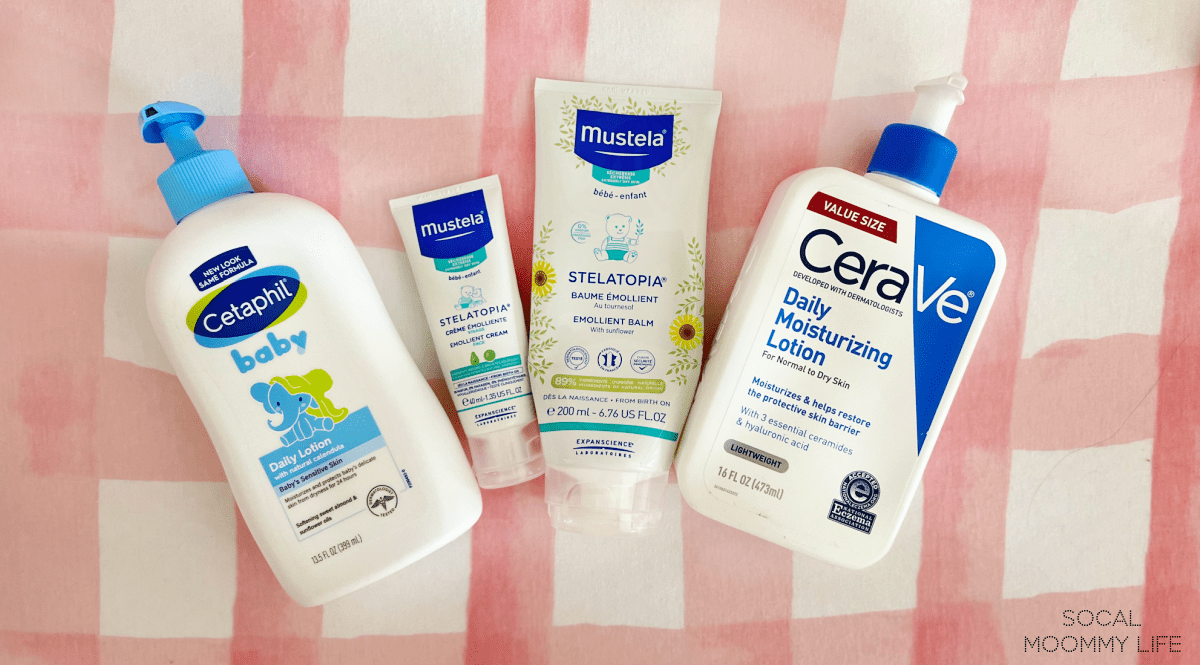
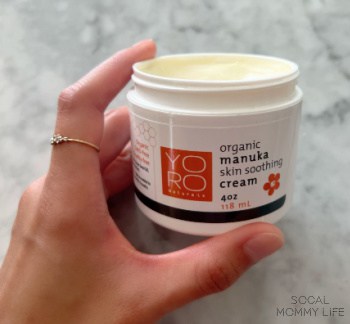
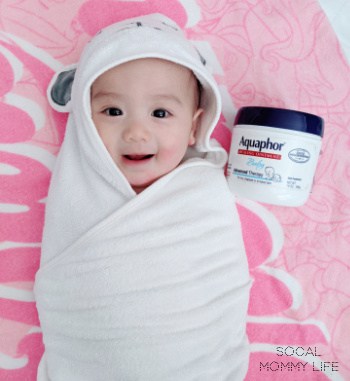
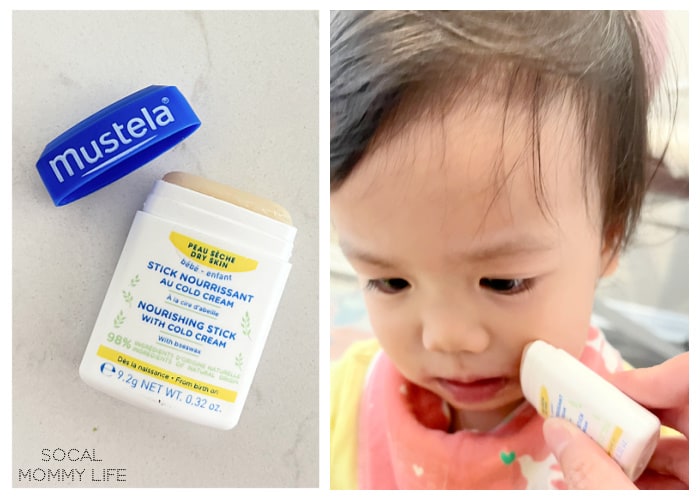
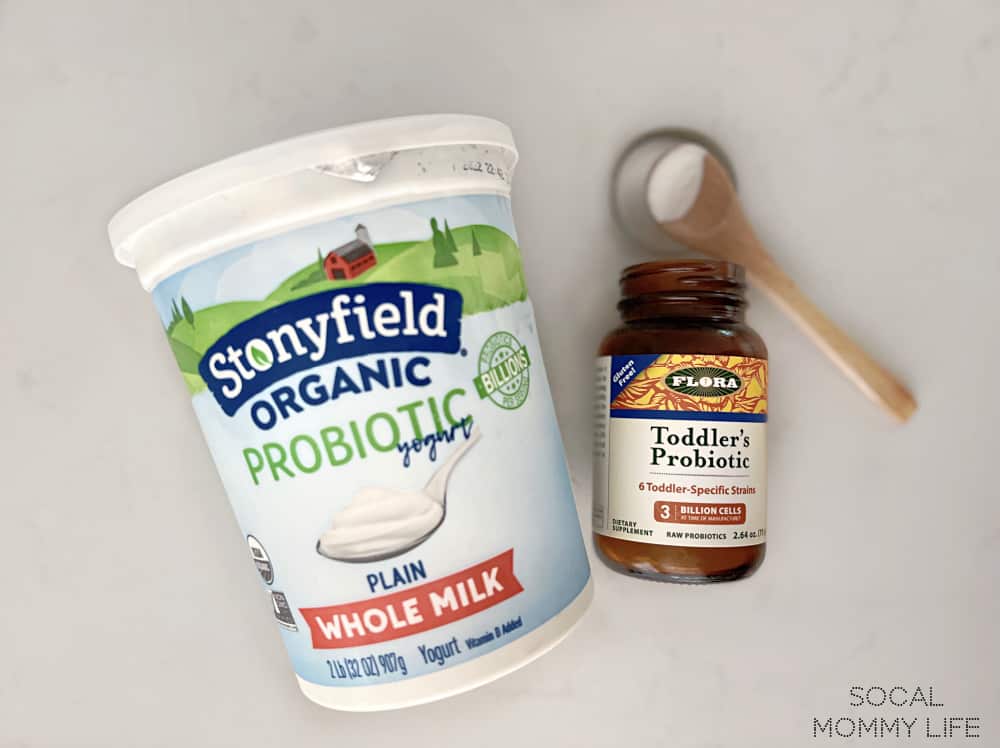


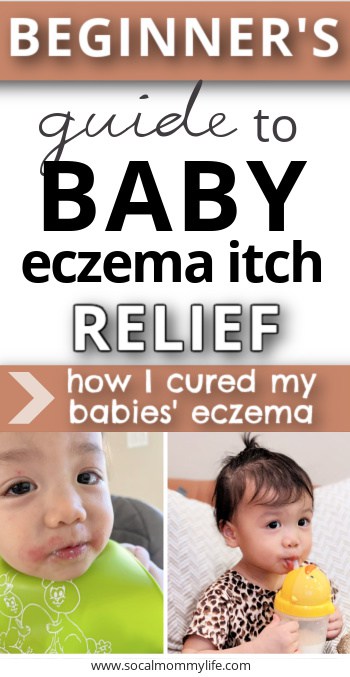
4 comments
This post is very informative. I think parents need to read this as it contains so many useful information to deal with this issue. I didn’t know that we should be moisturizing baby skin 4 times a day! It’s a lot of work, but I guess if it helps to alleviate the issue, it should be done!
Yes, taking care of kids with eczema is hard work but it’s worth it helping them find relief.
This was so helpful! My 2 year old has eczema and we just switched to using Dove bar soap for exactly the reasons you mentioned. I have to try that probiotic breakfast recipe!
Thank you. I’m glad you found this post helpful!